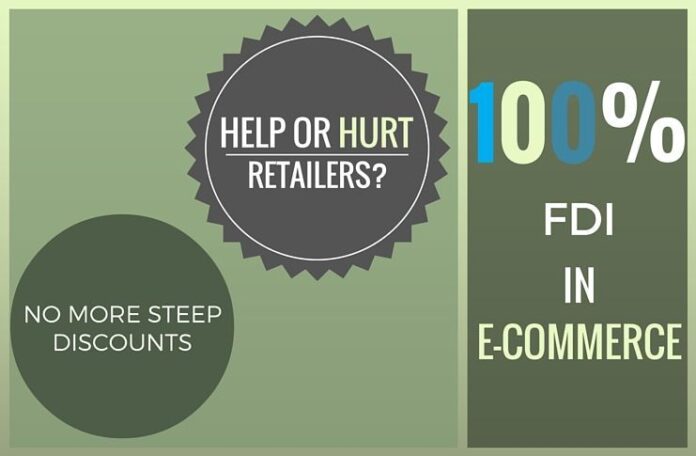
[dropcap color=”#008040″ boxed=”yes” boxed_radius=”8px” class=”” id=””]G[/dropcap]ovt announces 100% FDI (Foreign Direct Investment) in E-commerce. This creates an unfair level playing field for Indian companies as most of the countries in the world have their interest rates at or just above zero. The Indian Retail Industry will bear the brunt of this decision…
For some perspective, let us look at what happened in the United States –
Walmart’s entry as a mega store sounded the death knell for mom and pop stores in every town in the United States. In just a few years, Walmart established a vice like grip on being the “Low price leader” in consumer goods.
America woke up a bit late to the dangers of Walmart but in the last few years, there have been regulations put in place to try and level the playing field somewhat. For instance, most new Walmart stores are required to be miles away from the center of the city.
However, Walmart’s lunch is now being eaten by Amazon, which started out by selling books and now sells everything an average household needs. The need for a family to get out and buy something has reduced drastically, which means that Walmart will soon be a statistic.
[dropcap color=”#008040″ boxed=”yes” boxed_radius=”8px” class=”” id=””]T[/dropcap]he move will allow 100% FDI in the marketplace model of E-commerce under the automatic route. This is nothing but a backdoor entry to global retailers that will allow them to sidestep restrictions in Multi-Brand Retail as E-commerce has no geographical restrictions.
In its quest for FDI, the Govt is increasing the stake limit in unwanted sectors. What’s the difference between UPA Congress & BJP? It was the BJP which opposed 100% FDI in Single Brand Retail. This Move to open up E-commerce sector will give a back door entry to lot of major international players waiting to enter India. Let us look at the numbers as to why this is a lose-lose proposition for Indian retailers:
-
Companies like Amazon get credit at the rate of 0.5 to 1% per annum. Indian retailers, who form part of the Un-incorporated sector in India, have to depend on Non-Banking Finance Corporations (NBFC) to get money at 16-18% interest. Even if they get loans from the banks, the rate of interest comes around 8-10%. The difference in borrowing rates is stark.
-
E-commerce companies, due to their global presence have the purchasing power to buy in bulk and therefore can lower the per unit cost of everything they sell. This, with the above point on interest rates, will wipe out India’s retail sector.
-
This will start an internecine warfare between the current e-Commerce companies as they will not be able to compete with new players who can wait out the startups till they run out of cash and then start raising prices. Either way, there is going to be blood in the marketplace.
[dropcap color=”#008040″ boxed=”yes” boxed_radius=”8px” class=”” id=””]W[/dropcap]hen the emphasis is on empowering small businesses and Prime Minister Modi also keep talking about his vision of promoting Make in India initiative, it is strange that the government is making this move. In reality this government is weakening them by a series of decisions — allowing FDI in food processing, levy of excise on jewelry and garments and now allowing 100% FDI in E-commerce. The micro, small and medium enterprises (MSME) will be the most affected sector.
This back door entry of FDI in E-commerce by circumventing the law of the land is a step in the wrong direction and will impact small traders and businessmen. The government has gone ahead with the decision without any discussion with various stakeholders on defining a marketplace. There were 60 million business enterprises involved in retail trade in India with as many as 460 million people dependent on retail trade for their livelihood. It said the sector contributed 45 per cent to India’s gross domestic product, with an annual turnover of ~39 lakh crore. MSME sector in India contributed 9 per cent to GDP, accounted for 36 per cent of the total value of exports and provided employment to over 80 million people through more than 36 million enterprises, and it has been growing consistently above 10 per cent for the past five years.
The E-commerce companies can operate Pan India with their logistics network, out of any State with Tax liability payable in only the state they are incorporated in (Headquarters). However, traders or MSMEs need to obtain separate registration in each state if they wish to conduct business activities in more than one state.
This post was written with the help of Natraj Shetty, a 27-year veteran in Retail, Branded Apparel industry, and is associated with Top International Brands. He is currently a Consultant and is contributing to the Nation to make it a better place.
- Palaniswamy sworn in as TN CM amidst much drama - February 18, 2017
- How Vadaam Mami is thriving post-demonetization - February 18, 2017
- What are the credentials of Palanisamy? - February 15, 2017











No point in whinging,Modi has shown his “finger” to all the “jokers” ( including me ) who voted for him.Jaitley as FM was clearly a “middle finger”.So let us sit back and endure this nonsense.